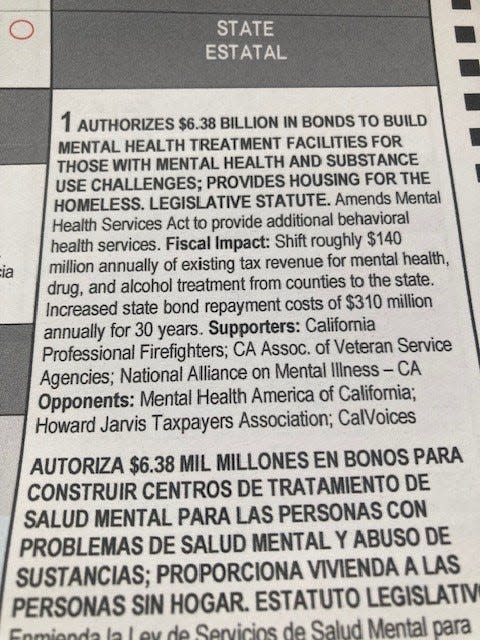By slimmest of margins, Calif. voters pass 'game-changing' bill for mental health services
- Oops!Something went wrong.Please try again later.
By the slimmest of margins, California voters approved a two-part ballot measure to restructure the state's mental health system and curb its longstanding homeless crisis.
Although election day was more than two weeks ago, it took until late Wednsday for enough votes to be counted to call the race in favor of Proposition 1 by a margin of 50.2% to 49.8%. The measure, strongly backed by Gov. Gavin Newsom, will allocate roughly $6.4 billion to build mental health treatment facilities and housing and assist the homeless.
To be determined: Supreme Court to decide if ticketing people who are homeless is 'cruel' punishment
Newsom has repeatedly called Proposition 1 a "game changer." He's said the plan will help fund more mental health care workers, "give those living on our streets to get the care they need," and provide $1 billion to help veterans.
Although Proposition 1 is not expected to substantially change the number of unhoused people in California, it had bipartisan support to help address the state's lack of housing and a mental health crisis that has been brewing for 75 years.
"We need to stabilize people," Newsom said during a campaign rally earlier this month in San Francisco. "We need to deal with the underlying reasons they’re out on the streets and sidewalks in the first place, the reasons they’re self-medicating with drug and alcohol addiction."

The close results showed that Californians likely have "bond fatigue," Brian Sobel, a longtime political analyst based in the San Francisco Bay Area, said a few days after the polls closed.
"California voters may be sending a message to lawmakers that they need to see more results from the money we spend and a more concerted effort. Otherwise, we just can't trust them when they ask for more money that it is spent wisely."
The division was largely geographic. Populous counties along the state's Pacific coastline generally supported the measure, while inland counties, where problems of homelessness are less visible, generally opposed it by much larger margins.
How Prop 1 will take shape in California
The measure authorizes the state to borrow $6.38 million in bonds against county mental health budgets, redirecting most of those funds toward new housing.
The money would be borrowed against income taxes already imposed on people who earn over $1 million annually. Now, that money is allocated entirely by counties.
About $4.4 billion will be used to add 6,800 mental health and addiction treatment beds and build 4,350 housing units, about half of which would be reserved for veterans.
California reportedly faces a shortage of almost 8,000 adult psychiatric beds, according to findings presented to state lawmakers last year by the RAND Corporation, a Santa Monica-based nonprofit.
Proposition 1 would also be an ambitious attempt to curb the state's ongoing homeless issues. According to recent statistics by the U.S. Department of Housing and Urban Development, California's homeless count surged to 181,000 people in 2022, a 60% spike over the past decade. The state's homeless figure accounts for nearly a third of the overall homeless population in the U.S.
The state would pay down the bonds with 30 annual $310 million payments, according to the state Legislative Analyst’s Office. The measure will reform a two-decade-old Mental Health Services Act that created a 1% personal income tax for those earning more than $1 million annually. This tax provides funding to county governments for mental health services.

Revenues from the so-called "millionaires tax" generate between $2 billion to $3 billion annually, about a third of the state's mental health budget, which goes to counties to help fund mental health programs with much flexibility.
About 76% of the tax money directed to counties is used for mental health treatments, housing, outreach and crisis programs. Another 19% is designated for prevention and intervention programs, like school-based mental health counseling. About 5% goes toward innovation.
But Newsom wants to give the state more control over how those monies are spent. Proposition 1 will allow the state to receive a larger share of the tax and require the 58 counties to spend about two-thirds of those funds on housing and rental assistance for the unhoused who are chronically homeless and have mental health or addiction issues.
About 35% would go toward mental health treatments for those same individuals and the remainder would be used for prevention services for youth, as well as workforce training and innovation projects.
Range of Prop. 1's impact will vary across California
The exact impact of Prop. 1 will vary by county and depend on how much revenue is collected in any given year, the California Budget & Policy Center, a nonpartisan research and analysis nonprofit, said in a January study.
"It’s important to keep in mind that the (state's Mental Health Services Act) funds services for Californians of all ages for a range of conditions — mild to moderate to severe. The restructuring of (the Mental Health Services Act's) funding would target a subset of this population," the nonprofit said. "Therefore, programs and services for prevention and early intervention in some counties, for instance, could experience disruptions due to the new prioritization of funding."
Opponents of the measure issued a statement saying that the ballot measure's near-loss "contains a strong warning" for the state's political leadership. "Prop. 1 does not just ‘reform’ the mental health system, it reduces funding for mental health services by redirecting $1 billion per year. Prop. 1 could be a humanitarian disaster if it is not well managed," the group Californians Against Proposition 1 said in a statement. "By cutting off services and reducing early intervention programs, Prop. 1 could have the perverse effect of increasing the number of people homeless and in need of services."
This article originally appeared on USA TODAY: California's Prop 1 for mental health services passes by slim margin

